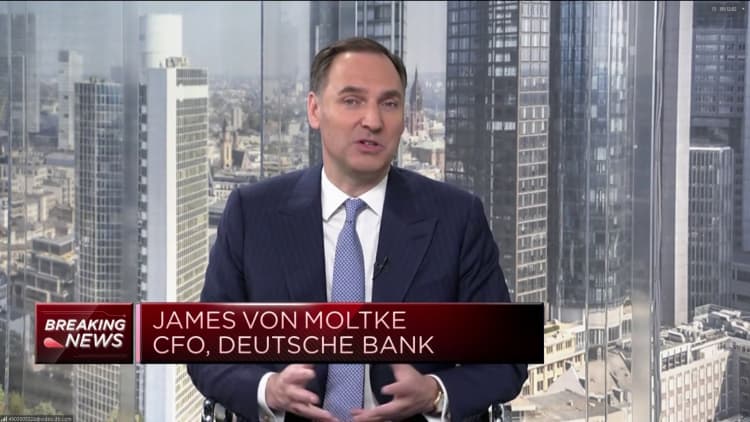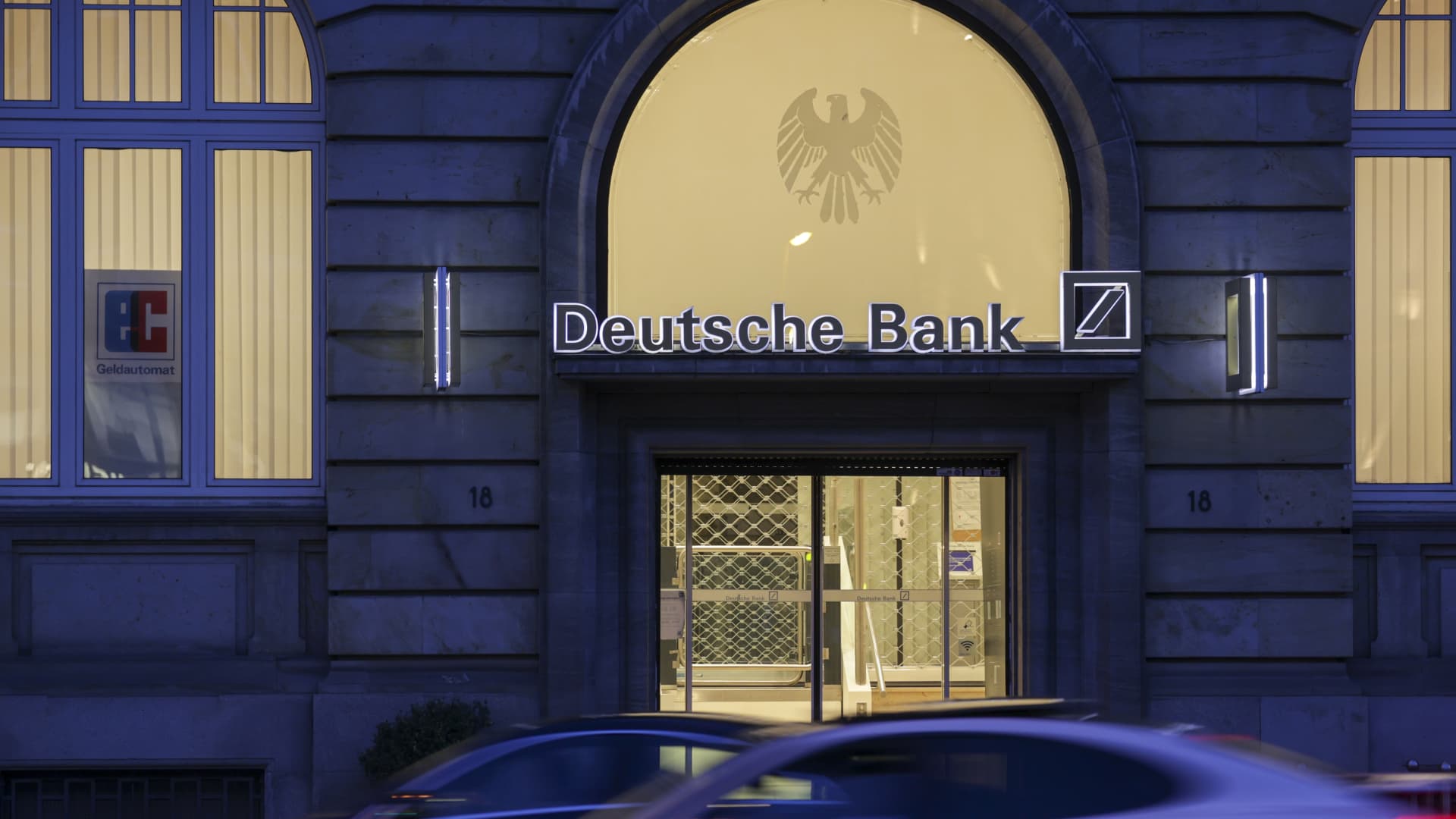A branch of Deutsche Bank AG in the financial district of Frankfurt, Germany, on Friday, May 6, 2022.
Alex Kraus | Bloomberg | Getty Images
Deutsche Bank reported a second-quarter net profit of 763 million euros ($842 million) for 2023, surpassing expectations despite a 27% year-on-year decline.
The bank’s net profit attributed to shareholders slightly exceeded the projected 737 million euros in a Reuters poll of analysts. However, it marked a significant drop from the 1.046 billion euros reported in the same quarter of 2022, while net revenues increased by 11% year-on-year to 7.4 billion euros.
Nevertheless, non-interest expenses for the second quarter rose by 15% year-on-year to 5.6 billion euros, with adjusted costs rising by 4% to 4.9 billion euros. Non-operating costs included 395 million euros in litigation charges and 260 million euros in “restructuring and severance related to execution of strategy.”
In its first-quarter report, the bank announced job cuts for non-client facing staff and reported a larger-than-expected year-on-year decrease in investment bank revenues.
Deutsche Bank’s corporate and private banking divisions had a strong quarter, with revenues increasing by 25% and 11% year-on-year, respectively, benefiting from the higher interest rate environment. However, its businesses more closely tied to the financial market backdrop, such as the investment banking and asset management divisions, experienced revenue declines of 11% and 6%, respectively.
Deutsche Bank CFO James von Moltke told CNBC that this could be attributed to an unusually strong second quarter of 2022, as market volatility boosted trading volumes and revenues.
Cost savings
During an interview with CNBC’s Silvia Amaro, von Moltke stated that the bank has increased its target for cost savings from 2 billion euros to 2.5 billion euros in order to offset the impact of inflation. Furthermore, the bank is making substantial investments in its business to support future revenue growth, improve technology, and enhance its controls.
Von Moltke said, “So for us, it’s a balancing act between delivery on the expense objectives and some of those inflationary impacts. In recent quarters, we’ve succeeded very well, we’ve delivered on our guidance of costs essentially flat to the fourth quarter of last year.”
“That’s something that we’re aiming to continue. We feel like the progress we’re making and those expense initiatives is considerable and accelerating.”

The second-quarter results mark the twelfth consecutive quarterly profit for Deutsche Bank since the completion of its comprehensive restructuring plan in 2019. The plan aimed to reduce costs and improve profitability.
Deutsche Bank CEO Christian Sewing said, “In the first half of 2023, we again demonstrated good growth momentum across a diversified business portfolio, underlying earnings power, and balance sheet resilience. This puts us on a good track towards our 2025 financial targets.”
Sewing added, “Our planned share repurchases enable us to deliver on our goals to distribute capital to our shareholders.”
Deutsche Bank announced its plans to initiate up to 450 million euros of share buybacks this year, starting in August. It also expects the total capital returned to shareholders through dividends and buybacks in 2023 to exceed 1 billion euros, compared to around 700 million euros in 2022.
Other highlights for the quarter:
- Total revenues stood at 7.4 billion euros, up from 6.65 billion in the second quarter of 2022.
- Total non-interest expenses were 5.6 billion euros, up 15% from 4.87 billion a year earlier.
- The provision for credit losses was 401 million euros, up from 233 million in the same quarter of last year.
- Common equity tier one CET1 capital ratio, a measure of bank liquidity, rose to 13.8% from 13.6% in the previous quarter and 13% a year ago.
- Return on tangible equity stood at 5.4%, down from 7.9% a year ago.
Benefiting from the Credit Suisse collapse
Deutsche Bank previously indicated that it could benefit from the collapse of Credit Suisse and its acquisition by UBS. Von Moltke mentioned during the interview that some of these benefits may already be materializing.
Von Moltke said, “All of these things take time. Certainly, on the hiring front, we’ve been able to attract talent as the fallout from the merger takes place, in two areas of our business in particular: wealth management and our origination and advisory franchise.”
“It’s obviously early days to see the revenue impact of those hires, but we’re very confident that we’ve been able to attract strong talent to the platform and fill in gaps, where we can now take advantage more fully of our own platform and market presence.”
Denial of responsibility! VigourTimes is an automatic aggregator of Global media. In each content, the hyperlink to the primary source is specified. All trademarks belong to their rightful owners, and all materials to their authors. For any complaint, please reach us at – [email protected]. We will take necessary action within 24 hours.


